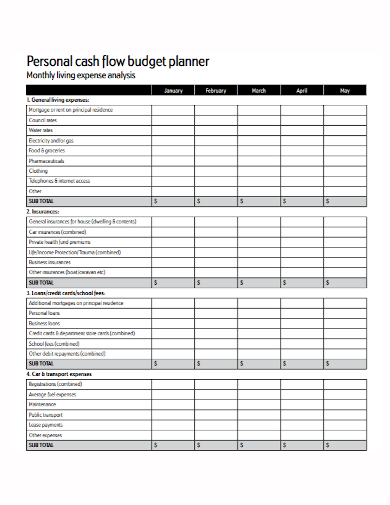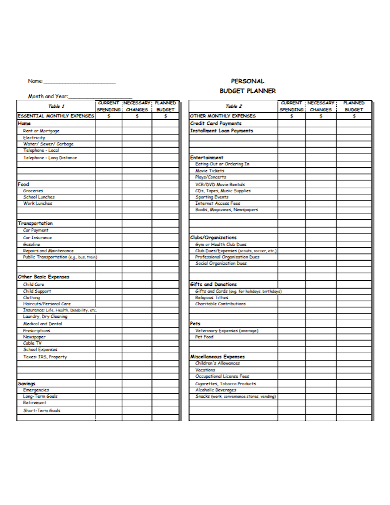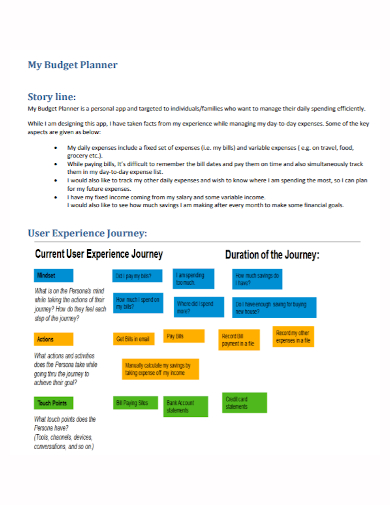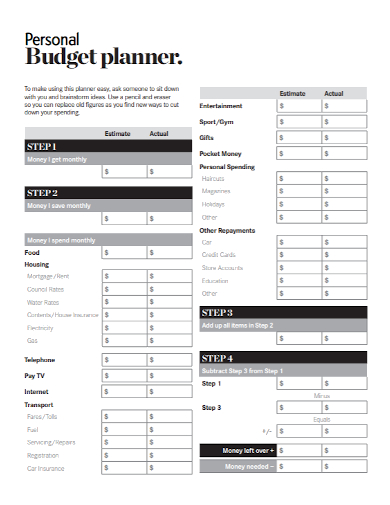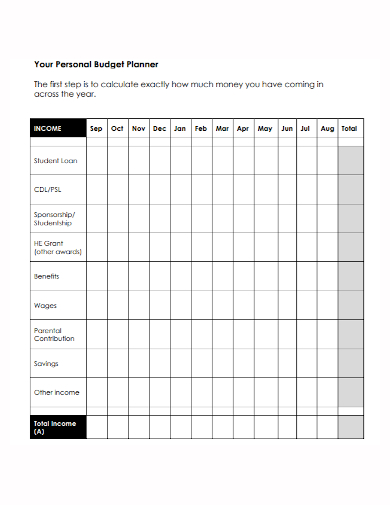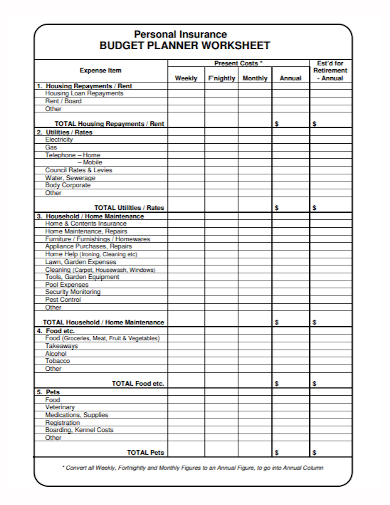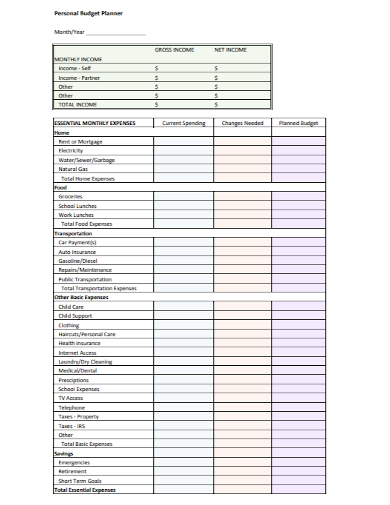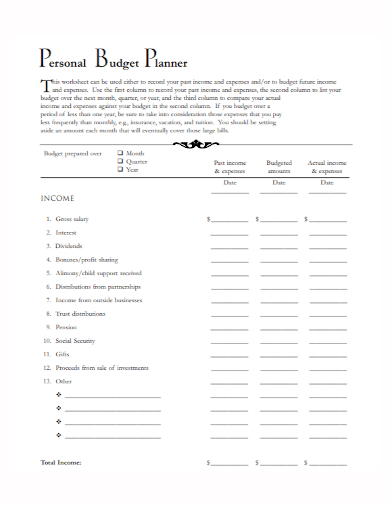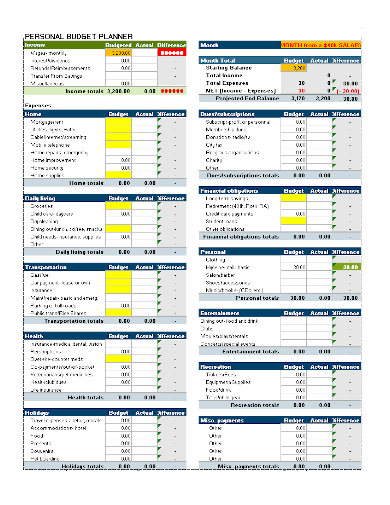Being financially wise in handling your money is an essential skill to have especially in these trying days where expenses are at an all-time high while most incomes of people stay stagnant. One good step in handling your money well and staying consistent on it is to create a budget suited to your needs and your flow of income and expenses. If you have a budget you avoid the risk of losing your money before your payday arrives and you result to having debts because of your squandering ways. This article will help you on how to create a personal budget planner. Keep reading the article below.
10+ Personal Budget Planner Samples
1. Personal Budget Planner Template
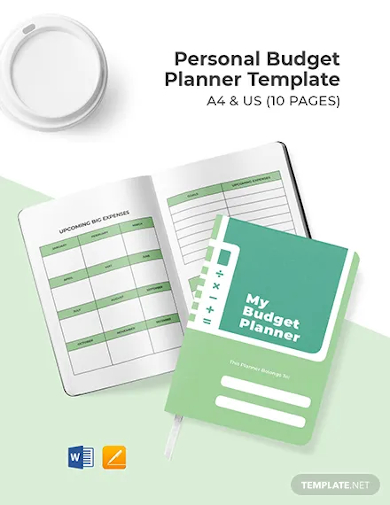
2. Personal Budget Planner Spreadsheet Template
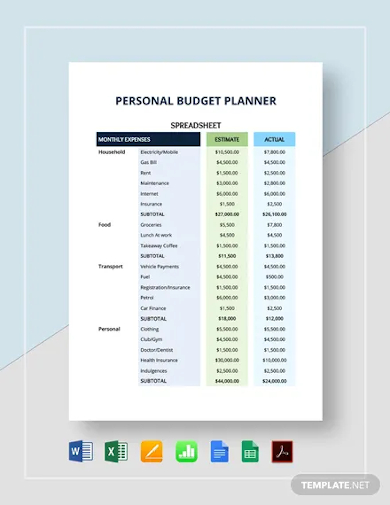
3. Personal Cash Flow Budget Planner
4. Personal Monthly Budget Planner
5. Sample Personal Budget Planner
6. Standard Personal Budget Planner
7. Personal Income Budget Planner
8. Personal Budget Planner Worksheet
9. Basic Personal Budget Planner
10. Professional Personal Budget Planner
11. Formal Personal Budget Planner
What is a Budget Planner?
A budget planner is a tool that helps a person decide how to spend their money wisely to avoid or reduce debt and to be able to set aside some money for their savings.
How to Create a Personal Budget Planner
1. Determine Your Monthly Income
The first thing to do is to know how much money you make each month. Know how often you get paid as this will affect how you divide your money on various expenses. If you have irregular income or if you’re self-employed, calculate how much net income you get every month.
2. List All Your Fixed Expenses
Fixed expenses are the type of expenses that remains the same every month. Examples of fixed expenses are rent, car payments, internet bills, electric bills, credit card payments, debt payments, and insurance. List all of them down in your planner worksheet or spreadsheet and organize them into one section.
Once you’ve listed them all down, add them all to get the total of your fixed expenses. The amount that will come out is your expected fixed expenses that you will have every month. Subtract the total from your net income to find out how much you will have for other types of expenses. This is a good way to base your monthly budget.
3. List all Your Variable Expenses
Your variable expenses are opposite to your fixed expenses; they change every month. Examples of variable expenses are groceries, eating out, shopping, classes, and other personal expenses. List down every single variable expense you spent last month. Knowing their costs or their estimates will give you a reflection on your spending habits. Add these expenses to get their total amount. Then add the total amount to the total amount of your fixed expenses. The answer is the number of your whole expenses in a month. See if your expenses are higher or lower than your net income. If it is, then you’re living above your means.
4. Evaluate Your Spending Habit
Categorize your expenses into bills, personal expenses, etc. Add the expenses in each category. This will help you analyze which area you’re spending your money on the most. It will also help you realize which areas that are unnecessary for you and you can scratch those out and add your money on other important expenses that you have or set it aside for your savings.
5. Create A Financial Goal
Now that you’ve analyzed your spending ways, it’s time to create your financial goals to help you motivate in keeping your budget planner and stick to spending your income wisely. One example of a financial goal that you can focus on is to save money every month. This will help you make changes to your habits such as by cutting back on your variable expenses that are not important and using that money for your savings.
FAQs
What is a balanced budget?
A balanced budget is what most people would at least want to acquire; it is when the expenses and income are equal to each other. Neither is a deficit nor a surplus.
What are the different budgeting techniques?
Below are the different budgeting techniques:
- The 50/30/20 rule: This rule is one of the most popular methods for budgeting since it is easier to do and maintain. This involves dividing your money into spending it in three categories such as essentials (50%), nonessentials (30%), and savings (20%).
- Zero-based budgeting: This type of budgeting estimate much you will make each month and then use your previous month’s income to pay for everything you need for the current month.
- The envelope system: This method involves the use of envelopes literally. You divide your monthly income in separate envelopes for each category in your budget. This helps you control your spending because if the cash runs out in one envelope to spend on certain expenses, you have no choice but to accept that your money is gone.
Once you’re done creating your budget planner, you can now use it regularly to track the progress of your spending habits and use it to further improve it. Having a budget planner and sticking to it can give positive changes in your behavior towards your finances and even help you do smart financial ways that will help you get rich financially. To help you get started on creating your budget planner, download our free sample templates above to use as your reference!
Related Posts
FREE 10+ Annual IT Budget Samples in MS Word | MS Excel | Google Docs | Google Sheets | PDF
FREE 5+ Yearly Budget Planner Samples in PDF | XLS
FREE 10+ Expense Budget Samples in MS Word | Google Docs | Google Sheets | MS Excel | PDF
FREE 4+ Vacation Budget Planner Samples in PDF
FREE 10+ Budget Outline Samples in PDF | MS Word
FREE 10+ Monthly Budget Worksheet Samples in PDF | MS Word | Google Docs | Google Sheets | Excel
FREE 10+ Monthly Project Budget Samples in MS Word | MS Excel | Google Docs | Google Sheets | PDF
FREE 10+ Corporate Budget Samples in MS Word | MS Excel | Google Docs | Google Sheets | PDF
FREE 9+ Primary School Budget Samples in MS Word | Google Docs | Google Sheets | MS Excel | PDF
FREE 10+ Operational Budget Samples in PDF | DOC
FREE 5+ Budget Layout Samples in PDF
FREE 6+ Paycheck Budget Samples in PDF | MS Word
FREE 10+ Architecture Budget Samples in PDF
FREE 10+ Budget Tracker Samples in PDF | DOC
FREE 4+ Corporate Monthly Budget Samples in MS Word | Google Docs | Google Sheets | Excel

